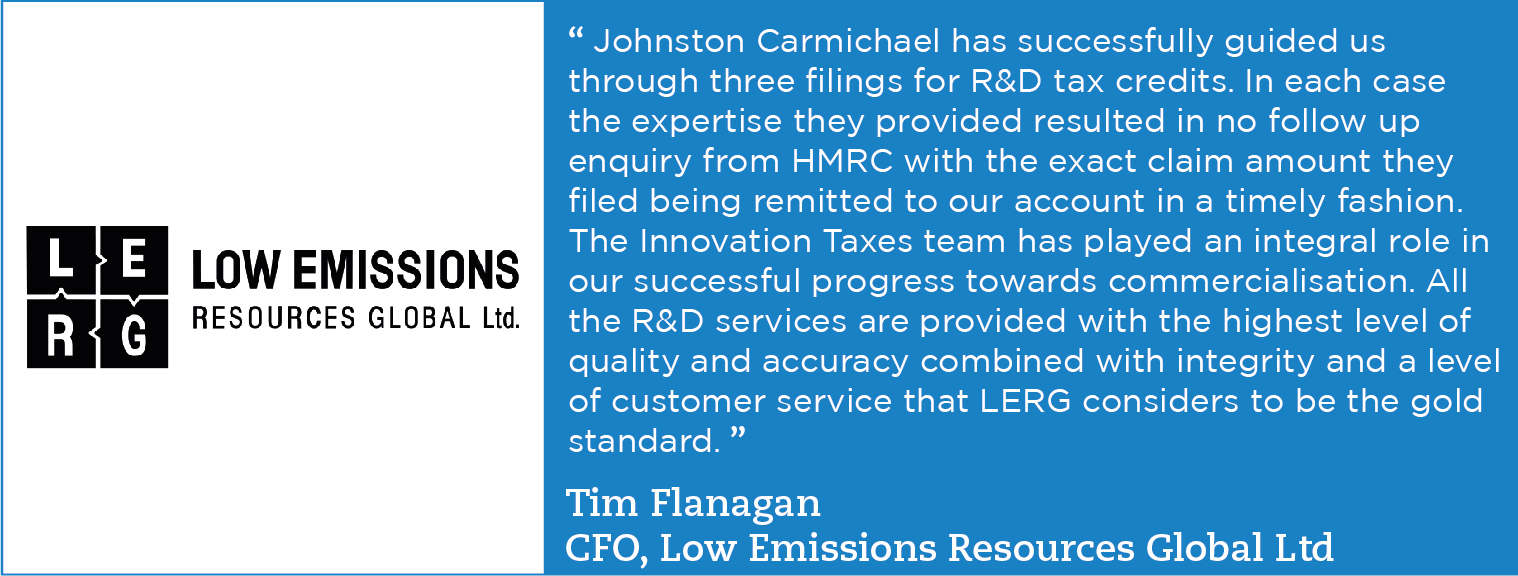Our Innovation Taxes team helps companies access R&D Tax Incentives, as well as other tax incentives for innovative and creative businesses, including Patent Box Relief and Video Games Tax Relief.
R&D Tax Incentives
The UK R&D Tax Incentive regimes are designed to promote private sector investment in innovation. Small and Medium-sized Enterprises (SMEs) can claim under the R&D tax credit scheme, whereas large companies (and SMEs carrying out funded or contract R&D) can claim under the Research and Development Expenditure Credit scheme (RDEC). For expenditure incurred prior to the 1 April 2023, SMEs can claim up to 33p for every pound of eligible expenditure on in-house, unfunded R&D, and can receive a cash payment even if they are loss-making or pre-trading.
Over recent Fiscal Events, the Government has announced a raft of changes to the R&D tax relief schemes, including changes to the rates of R&D tax relief available. These affect current claimants of R&D tax relief under both the SME and RDEC schemes and apply to expenditure incurred on or after 1 April 2023. For expenditure incurred on or after this date, a company claiming under the SME scheme can receive relief of up to 27p for every pound of eligible expenditure incurred. The precise rate of relief available, which can range from 18.6p to 27p, will be dependent on the claimant company’s circumstances. With regards to the RDEC scheme, for expenditure incurred on or after 1 April 2023, the effective rate of relief will be 15p for every pound of eligible expenditure incurred.
In addition, for accounting periods starting on or after 1 April 2024, all R&D claimants that do not qualify as R&D intensive SMEs will move to claim under the Single Merged R&D Scheme, with the effective rate of relief mirroring the aforementioned RDEC rate, i.e. 15p for every pound of eligible expenditure incurred. - find out more.
Patent Box Relief
Once technology has been developed and commercialised, Patent Box Relief can offer significant Corporation Tax savings to companies on the profits they generate.
Companies that elect into the Patent Box regime obtain an effective 10% rate of Corporation Tax on profits attributable to qualifying Intellectual Property (IP), rather than the main rate of Corporation Tax (25% from April 2023, subject to a small profits rate and marginal relief). The Patent Box regime is complex; however, at Johnston Carmichael our specialists are on hand to help you through every step of the process.
We offer a range of Patent Box Relief services, from feasibility studies to full claim preparation - find out more.
Video Games Tax Relief
For years, Video Games Tax Relief (VGTR) has been a pillar for the UK video games sector, supporting growth, inward investment, and job creation, and driving a strong and thriving video games industry.
With the likes of France, Germany and Ireland offering more generous tax incentives to video game development companies, the UK Government had come under pressure to reform VGTR to mitigate the risk of weakening one of the pillars of the modern UK economy.
As part of Spring Budget 2023, the Government announced that VGTR will be phased out and replaced with the Video Games Expenditure Credit (VGEC). The VGEC has been available for companies to claim from 1 January 2024. Although the new credit is slightly more generous than the existing VGTR, and much of the existing rules are being maintained, there are some other important differences which, if not considered, could leave studios worse off.
Our games team can help you navigate the complexities and ensure that you are claiming the correct relief for your specific studio / development circumstances during the sunset period for VGTR, which runs to 31 March 2027.
We offer a range of VGTR Services, from feasibility studies to full claim preparation - find out more.
What our clients say

View our other services
Arrange a free consultation with the team now
Have a general enquiry? Get in touch.




